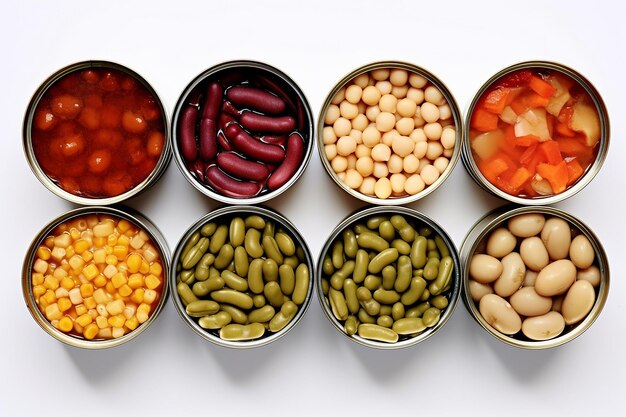
Conserved products
Iran has a diverse agricultural sector and is involved in the production and export of various food products, including conserved items like corn, tuna, beans, and other foods. Here are some key points about Iran’s food conservation and export practices:
Corn
Production: Iran grows corn, primarily in the provinces of Khuzestan, Fars, and Mazandaran. The country focuses on both grain and silage corn to meet domestic demand.
Export: While corn production is significant, Iran primarily imports corn for animal feed. However, any surplus production could be directed towards regional exports.
Tuna
Fishing Industry: Iran has a substantial fishing industry, with the Persian Gulf and the Caspian Sea being primary fishing areas. Tuna is a major component of the seafood sector.
Conservation and Export: Iran processes and cans a significant amount of its tuna catch. Iranian canned tuna is exported to various countries in the Middle East and other regions, benefiting from lower production costs and strategic geographic location.
Beans
Varieties: Iran produces various types of beans, including chickpeas, lentils, and kidney beans. These are grown in regions like Lorestan, Kermanshah, and Golestan.
Export: Beans are an important export product for Iran, with significant quantities being sent to neighboring countries. The country’s dry climate is conducive to the production of high-quality beans, which are preserved and exported.
Other Conserved Foods
Fruits and Vegetables: Iran produces a wide range of fruits (such as pomegranates, pistachios, and dates) and vegetables. Many of these are dried or canned for export.
Nuts and Dried Fruits: Iran is one of the world’s largest producers of nuts (especially pistachios and almonds) and dried fruits (like raisins and apricots). These products are extensively exported.
Pickled Products: Various pickled vegetables are produced for both domestic consumption and export, taking advantage of traditional Iranian methods of food preservation.
Export Markets
Middle East and Central Asia: The primary export destinations for Iran’s conserved food products are neighboring countries in the Middle East and Central Asia.
European Union: Some products, especially nuts and dried fruits, find their way to European markets.
Regulatory Challenges: Iranian exporters often face challenges due to international sanctions and regulatory barriers, which can affect the export volume and reach.
Economic Impact
Agricultural Sector: Agriculture plays a vital role in Iran’s economy, employing a significant portion of the population and contributing to GDP.
Diversification: The export of conserved foods helps Iran diversify its economy, reducing dependency on oil exports.
Iran’s strategy for conserving and exporting food involves leveraging its diverse agricultural base, traditional preservation techniques, and strategic geographic location to maintain and grow its presence in regional and global markets.
Buying conserved products from Iran offers several advantages, which might appeal to different buyers depending on their needs and preferences. Here are some compelling reasons to consider purchasing conserved products from Iran:
High-Quality Products
Rich Agricultural Land: Iran’s diverse climate and fertile soil contribute to the production of high-quality agricultural products, including fruits, vegetables, nuts, and legumes.
Traditional Methods: Many Iranian conserved foods are prepared using traditional methods that enhance their flavor and nutritional value.
Cost-Effectiveness
Competitive Pricing: Iran often offers competitive pricing for its conserved products due to lower production and labor costs. This can be particularly advantageous for bulk buyers.
Value for Money: The quality of Iranian products often matches or exceeds that of more expensive alternatives from other countries, providing good value for money.
Unique and Diverse Offerings
Specialty Products: Iran is known for its specialty products like Persian saffron, pistachios, and dried fruits, which are sought after for their unique flavors and high quality.
Wide Range: The variety of conserved products, from canned tuna and beans to dried fruits and nuts, allows buyers to source multiple items from a single supplier.
Nutritional Benefits
Healthy Choices: Many of Iran’s conserved products, especially nuts, dried fruits, and legumes, are known for their health benefits, providing essential nutrients and antioxidants.
Sustainability and Natural Practices
Organic and Natural Farming: Many Iranian farmers use sustainable and organic farming practices, which can be appealing to buyers looking for eco-friendly products.
Traditional Preservation: Traditional methods of drying, pickling, and canning often result in fewer preservatives and additives, aligning with consumer preferences for natural food products.
Cultural and Culinary Appeal
Authentic Flavors: Iranian conserved foods bring authentic Persian flavors to international markets, appealing to culinary enthusiasts and chefs looking to recreate traditional Iranian dishes.
Culinary Diversity: These products can add diversity to menus and retail offerings, attracting customers interested in international cuisine.
Geographical Advantage
Proximity to Major Markets: Iran’s strategic location allows for relatively quick shipping to many countries in the Middle East, Europe, and Asia, reducing transportation time and costs.
Established Trade Routes: Longstanding trade relationships with neighboring countries facilitate smoother transactions and reliable delivery schedules.
Economic and Trade Considerations
Support for Local Economies: Purchasing from Iran can support local farmers and producers, contributing to economic stability and growth in rural areas.
Trade Agreements: Depending on the buyer’s country, there may be favorable trade agreements in place that reduce tariffs and import costs.
Innovation and Adaptability
Modern Facilities: While traditional methods are valued, many Iranian producers also utilize modern facilities and technologies to ensure high standards of hygiene and quality in their conserved products.
Adaptability: Iranian producers are often willing to adapt to specific requirements and standards of international markets, ensuring compliance with various health and safety regulations.
By considering these factors, buyers can see the potential benefits of incorporating Iranian conserved products into their supply chains, offering high-quality, diverse, and cost-effective options to meet consumer demands.

